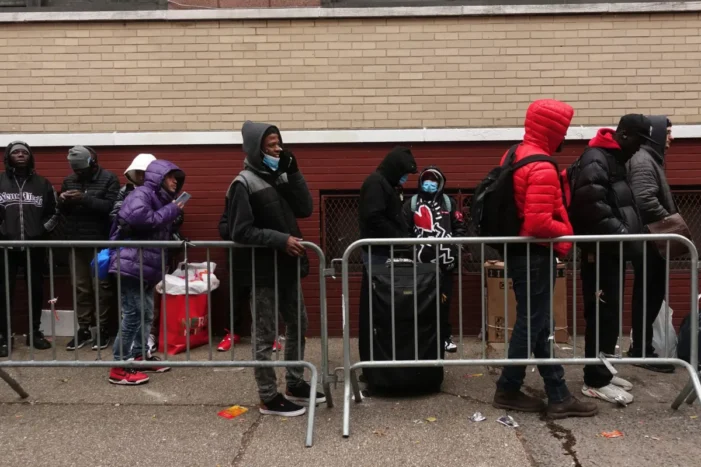By Gwynne Hogan
New York City can restrict shelter stays for adult migrants to a single 30-day placement, with extensions granted only under “extenuating circumstances,” according to the terms of a settlement reached Friday between city officials and homeless rights advocates.
The agreement between City Hall and the Coalition for the Homeless — after five months of private negotiations — also gives the city broader latitude to deny shelter to adult “new arrivals” without children if they determine they have the means to stay elsewhere, as well as migrants whom the city deems haven’t made sufficient effort to find a place to live before their 30 days in shelter expire.
“The status quo could not have worked in this situation,” said Deputy Health and Human Services Commissioner Anne Williams-Isom, speaking at a news conference outside of Manhattan Supreme Court shortly after the proceeding.
After 30 days, she said, “people will not be able to reapply unless there are extenuating circumstances. We will make individual determinations to see whether people need something more.”
The settlement applies to single adults and adult families deemed “new arrivals,” meaning they entered the United States after March 2022. It has no bearing on migrant families with children, who account for 78% of the 64,000 migrants in city shelters, or other homeless New Yorkers in the city’s shelter system.
Some migrant families are subject to 60-day limits in shelter stays and can reapply at the Roosevelt Hotel on East 45th Street in Manhattan, while other homeless New Yorkers have no formal limits on their stays thanks to the 1981 consent decree that established the city’s “right to shelter.”
The settlement withdraws Mayor Eric Adams’ request, first submitted in State Supreme Court last May, and then revised in the fall, asking a judge to waive the requirement that the city provide shelter to adults when a spike of new people enter shelters.
Still, advocates for the homeless expressed concern that, depending on how they are implemented, the new rules could lead to a surge in street homelessness.
“I fear for the worst,” said Jamie Powlovich, executive director of Coalition for Homeless Youth. “With the way that services are provided across the new arrival shelters, this is definitely going to result in a lot of people on the street.”
Others criticized the creation of a special category in the decades-old consent decree for “new arrivals,” effectively creating a separate set of rules for longterm New Yorkers or anyone who arrived before the cut-off date.
“This is not a safeguard of the right to shelter,” the SafetyNet Project tweeted on X. “This is a xenophobic rollback.”
‘Extenuating Circumstances’
Both the Coalition for the Homeless and city and state officials celebrated the terms of the new agreement, arguing it preserves the main pillars of the 1981 decree, which the Adams administration had been trying to do away with completely, while allowing the city more flexibility to respond to an unprecedented surge in new arrivals from the southern border. The provisions that apply to new arrivals are temporary until the current crisis subsides.
Attorney Steven Banks, a former Department of Social Services commissioner who spoke on behalf of the Coalition for the Homeless and the Legal Aid Society — and who helped argue the original right-to-shelter case decades ago — said the city’s guarantee of a place to sleep has saved countless lives in the 42 years it’s been on the books.
“The basic protection that has saved those lives will remain in place in the settlement,” he said. “There will be a safety net for human beings who would otherwise end up in the streets and the subways.”

Under prior rules, adult migrants had strict 30-day stays but then were required to leave their shelter at the time to apply for another stay, a wait that was taking days or even weeks. Migrants waiting for cots were sent to overnight waiting rooms to sleep on the floor or in chairs, or ended up on the subways and streets.
That system will be phased out by April 8 and migrants will be able to apply for extensions to their current shelter stay.
The settlement lays out a host of “extenuating circumstances” that could score someone an extension: if they can show they have a place to move or have an immigration hearing in the next month, or if they have a serious medical procedure in the next month or are recovering from one.
The city could also consider lengthening a shelter stay if the new arrival is found to have made “significant effort” to find somewhere else to stay but hasn’t been able to. Those efforts could include reaching out to friends and family, applying for resettlement programs, looking for work, getting a driver’s license, taking job training or English classes.
The city will evaluate each person’s request for an extension on a case-by-case basis. The settlement does not specify which agency will oversee the operation.
But looming questions remain about how the new rules will be implemented, and what happens if people get locked out of the system with nowhere else to go.
“We have already seen that the 30-day deadline has caused an increase in street homelessness,” said Deb Berkman, an attorney at New York Legal Assistance Group who works with the newly arrived. “How is it going to play out? What does significant effort mean? People are already trying to find other places to live.”
This story was published by THE CITY on March 15, 2024.

